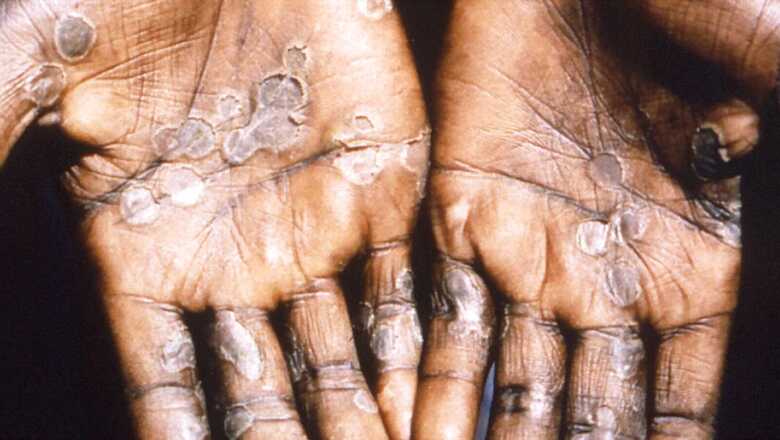
views
At least 98% of the persons with monkeypox infection were gay or bisexual men, the analysis published in the latest issue of New England Journal of Medicine finds.
Calling for an urgent need for “rapid identification" and “diagnosis" to contain the community spread, it recorded rashes, fever, lethargy, myalgia headache and swelling of the lymph nodes as the most common symptoms of monkeypox infection.
Analysing the recent spread of the virus, the article titled ‘Monkeypox Virus Infection in Humans across 16 Countries — April–June 2022’ said that before April 2022, monkeypox virus infection in humans was seldom reported outside African regions, where it is endemic.
Currently, cases are occurring worldwide, including in India, where a third case was reported on Friday.
The paper on 528 monkeypox cases in 16 nations, published on July 21, indicates that a sexual relationship between men could be a possible link behind the spread. However, since these are initial studies, the results may not be conclusive and concrete.
“We reported 528 infections diagnosed between April 27 and June 24, 2022, at 43 sites in 16 countries. Overall, 98% of the persons with infection were gay or bisexual men, 75% were white, and 41% had human immunodeficiency virus infection; the median age was 38 years," said the article.
“Transmission was suspected to have occurred through sexual activity in 95% of the persons with infection."
HOW THE STUDY WAS CONDUCTED
The analysis concludes that “the simultaneous identification of cases outside areas where monkeypox has traditionally been endemic highlights the need for rapid identification and diagnosis of cases to contain further community spread".
The authors of the article – more than 30 – formed an international collaborative group of clinicians who contributed to an international case series to describe the presentation, clinical course, and outcomes of polymerase-chain-reaction–confirmed monkeypox virus infections.
The authors come from a variety of backgrounds, including Queen Mary University of London, and the Department of Infection and Immunity, Barts Health NHS Trust, Homerton University Hospital, Clinical Infection Unit, St. George’s University Hospitals and McGill University Health Centre, Montreal, among others.
In response to the worldwide outbreaks, academic researchers within the London-based Sexual Health and HIV All East Research (SHARE) Collaborative contacted peers in affected countries through informal clinical and research networks and formed a global collaborative group (SHARE-net).
The data was stored and analysed within the Queen Mary University of London Barts Cancer Institute data safe haven.
SYMPTOMS, TREATMENT
In this case series, monkeypox manifested with a variety of dermatological or skin-related issues.
The most common is skin lesions which are part of the skin that has an abnormal growth or appearance compared to the skin around it.
According to the analysis, 95% of the persons presented with a rash (with 64% patients having less than 10 lesions), 73% had anogenital lesions and 41% had mucosal lesions (with 54 having a single genital lesion).
Common systemic features preceding the rash included fever, lethargy, myalgia, and headache and swelling of the lymph nodes.
As per the article, among the 23 persons with a clear exposure history, the median incubation period was seven days – ranging between 3 and 20 days.
Antiviral treatment was given to 5% of the persons overall, and 70 patients were hospitalised.
The reasons for hospitalisation were pain management, mostly for severe anorectal pain, soft-tissue superinfection, sore-throat limiting oral intake, eye lesions, acute kidney injury, inflammation of the heart muscles and infection-control purposes. However, no deaths were reported.
However, an advisory issued by the World Health Organisation clarifies, “Stigmatising people because of a disease is never ok. Anyone can get or pass on monkeypox, regardless of their sexuality."
“It is important to note that the risk of monkeypox is not limited to men who have sex with men. Anyone who has close contact with someone who is infectious is at risk."
Another press statement by UNAIDS expressed concern that “some public reporting and commentary on monkeypox has used language and imagery, particularly portrayals of LGBTI and African people, that reinforce homophobic and racist stereotypes and exacerbate stigma."
“Lessons from the AIDS response show that stigma and blame directed at certain groups of people can rapidly undermine outbreak response."
















Comments
0 comment